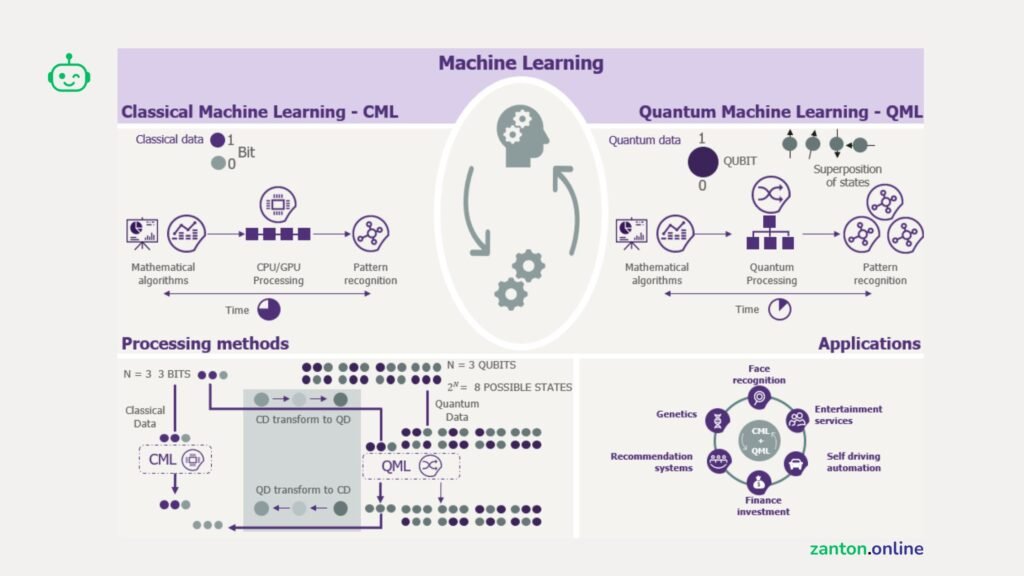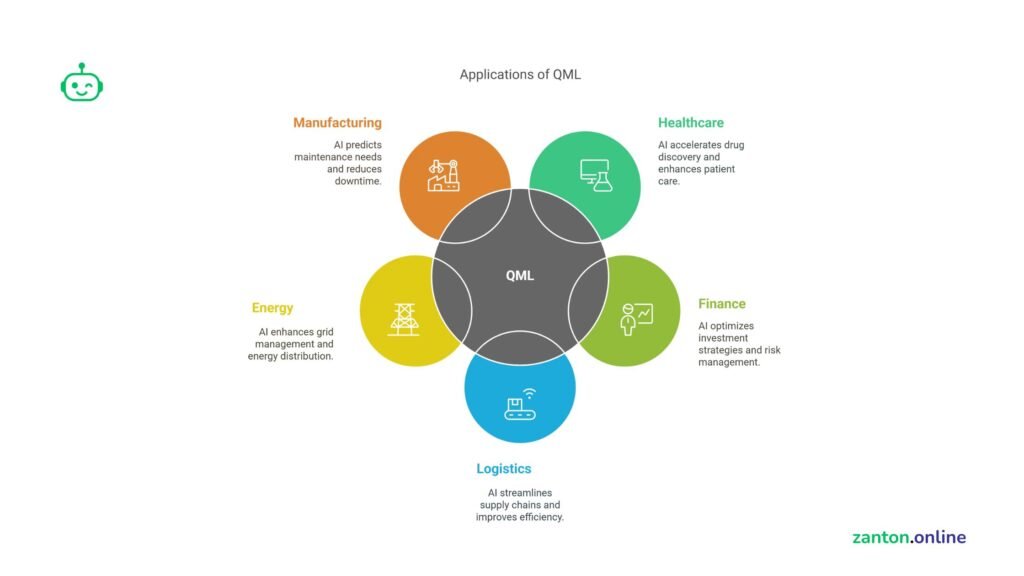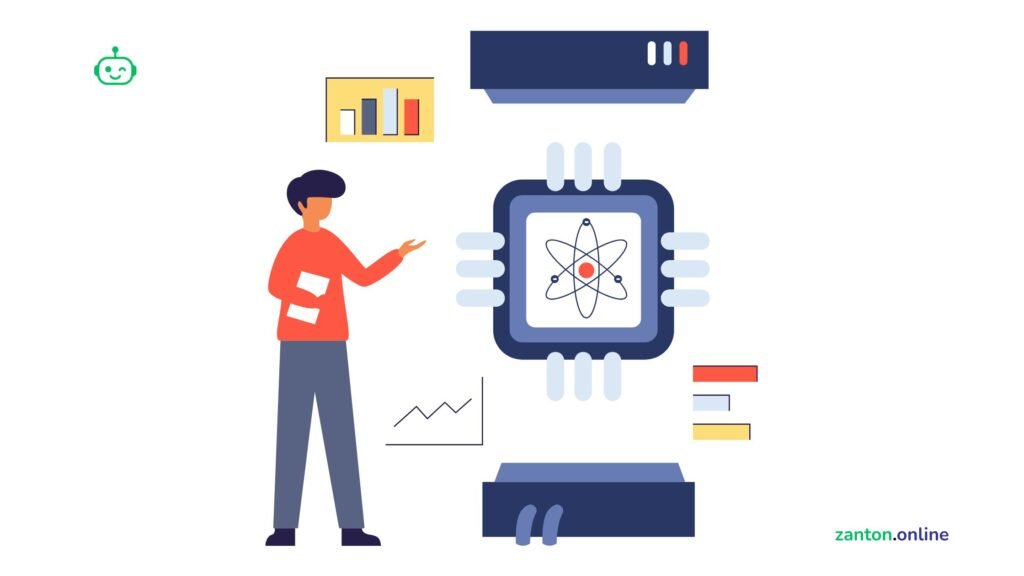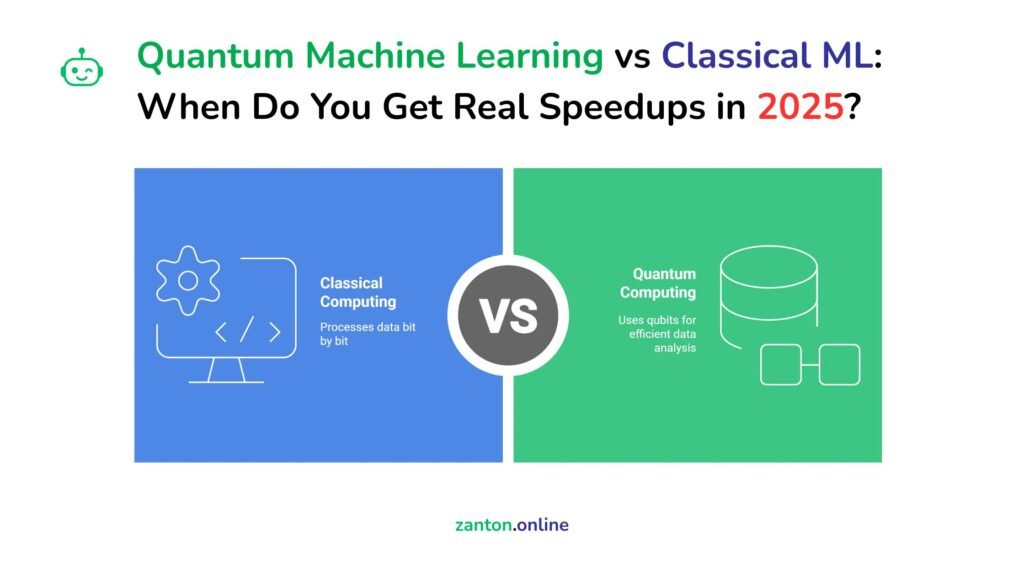Quantum Machine Learning (QML) is one of the most exciting fields combining quantum computing and machine learning. Many researchers believe QML can unlock real speedups for problems that classical ML cannot solve efficiently.
Thank you for reading this post, don't forget to subscribe!But in 2025, the truth lies in understanding where we actually see quantum advantages and what remains just theory.
This guide explains when Quantum Machine Learning gives real speedups over Classical ML. It also explores career paths, tools like Qiskit, academic references like Quantum Machine Learning Biamonte, and answers real-world FAQs based on industry growth.
When Do We See Quantum Speedups?
You get real speedups from Quantum Machine Learning in 2025 only when:
- The problem involves very high-dimensional data that scales too fast for classical computers.
- You need to analyze exponentially large spaces, where quantum states can naturally encode information faster.
- Algorithms such as quantum kernels or variational quantum circuits provide genuine efficiency improvements.
- You run workloads on specialized quantum computers that can outperform GPUs in specific optimization tasks.
So, while QML is not replacing classical ML across the board, it shows practical speedups in optimization, quantum chemistry, logistics, and material science.
Table: Quantum ML vs Classical ML at a Glance

| Feature | Classical ML | Quantum Machine Learning |
|---|---|---|
| Data Handling | Works well on structured and large datasets but struggles with exponential scaling | Encodes data into quantum states enabling exponential processing |
| Algorithms | Deep learning, supervised, unsupervised, reinforcement | Quantum kernels, variational algorithms, hybrid quantum-classical methods |
| Hardware Need | CPUs, GPUs, TPUs | Quantum computers (qubits) with noise challenges |
| Speedups | Polynomial improvements with scaling | Potential exponential or quadratic speedups in selected cases |
| Practical Use in 2025 | Broad adoption across industries | Early adoption in finance, pharma, optimization, material science |
Quantum Machine Learning Basics
Quantum Machine Learning combines machine learning algorithms with quantum mechanics principles such as superposition, entanglement, and interference. This allows algorithms to explore huge solution spaces faster than classical computing.
Classical ML relies on bits (0s and 1s). Quantum ML, however, uses qubits, which can exist in multiple states at once. This means a quantum machine can process vast data in fewer steps.
Example: Image Classification
- A classical ML model like CNN works with pixel matrices.
- A QML model encodes these matrices into a quantum state, processing them more efficiently with quantum kernels.
How Quantum Differs from Classical ML
- Classical ML uses linear algebra over real numbers.
- Quantum ML relies on linear algebra in Hilbert space, handling probabilities of quantum states.
- Classical learning requires training large parameter sets, while Quantum ML can compress data into fewer qubits for faster insights.
Areas Where Quantum ML Excels in 2025
- Finance: Portfolio optimization, risk modeling, fraud detection.
- Healthcare: Drug discovery, protein folding, medical imaging.
- Supply Chain & Logistics: Route optimization problems.
- AI Research: Enhancing model training with quantum-enhanced kernels.
These are the real-world cases where quantum already shows speedups compared to classical ML.
Tools and Frameworks
- Quantum Machine Learning Qiskit: IBM’s open-source framework for QML experiments.
- PennyLane: Popular for hybrid quantum-classical models.
- TensorFlow Quantum: Extends ML workflows into quantum computing.
These tools help researchers bridge between quantum devices and classical ML.
Quantum Machine Learning Jobs in 2025
As industries explore QML, quantum machine learning jobs are in demand. Fields hiring include:
- Tech Companies: IBM, Google, Microsoft, Nvidia.
- Finance: Banks adopting quantum for risk modeling.
- Pharma: Quantum for drug development.
Average Career Insights
- Entry salary range: $100,000 – $140,000 in the US.
- Senior quantum ML engineers: $150,000 – $200,000+.
- Specialized roles in R&D may go even higher.
Career growth is strong due to few experts in this domain.
Quantum Machine Learning Courses
Learning paths for beginners:
- Basics of quantum computing (qubits, gates, superposition).
- Machine learning foundations.
- Hands-on with Qiskit, PennyLane, TensorFlow Quantum.
Several universities and online platforms now offer quantum machine learning courses with practical labs on real quantum hardware.
Academic Foundation: Biamonte’s Contribution
One of the most cited works in this field is the paper by Jacob Biamonte, titled Quantum Machine Learning. It shaped the foundation of QML by categorizing quantum algorithms and linking them with ML principles.
For students, Quantum Machine Learning Biamonte remains a key entry point into research papers and guides.
Quantum Machine Learning Journals
By 2025, dedicated research outlets have emerged under quantum machine learning journals, covering:
- Advances in hybrid algorithms.
- Quantum kernels in practical datasets.
- Benchmarking quantum vs classical ML performance.
Researchers rely on these journals to compare hype vs real progress.
Applications of Quantum Speedups

- Optimization: QML solves input-heavy optimization tasks faster.
- Drug Discovery: Speeds up molecule modeling.
- AI Training: Helps optimize massive models.
Quantum ML doesn’t yet replace deep learning everywhere, but for specialized, exponential-scaling problems, it shows undeniable future promise.
FAQs
What are the 4 types of machine learning models?
Supervised, Unsupervised, Reinforcement, and Deep Learning.
How is a quantum machine different from AI?
AI is a field of algorithms and intelligence, while a quantum machine is hardware that processes qubits. QML combines the two.
What is the salary of quantum machine learning?
In 2025, salaries range from $100,000 to $200,000+ depending on expertise and role.
Will quantum computing replace AI?
No, but it will enhance AI in certain problems. They complement each other.
Is quantum machine learning a good career?
Yes, it is one of the fastest-growing tech fields with high-paying jobs and low competition.
How much does IBM pay quantum software engineers?
IBM pays around $120,000 to $160,000 for mid-level engineers, with senior roles going higher.
Does ChatGPT use quantum computing?
No. ChatGPT runs on GPUs and cloud hardware, not quantum computers.
Does Nvidia do quantum computing?
Yes, Nvidia provides simulation platforms supporting quantum research but does not yet build quantum computers.
What language is used in a quantum machine?
Quantum programming uses Python-based frameworks like Qiskit, PennyLane, and Cirq.
Which country is using quantum computing?
US, China, Canada, Germany, and Japan lead research and adoption of quantum computing.

Final Thoughts
In 2025, Quantum Machine Learning shows speedups but only in carefully chosen problems. It is not meant to fully replace classical ML but serves as a powerful partner for tasks involving exponential complexity.
For readers, this is the moment to explore Quantum Machine Learning courses, follow QML journals, learn frameworks like Qiskit, and consider career paths in quantum machine learning jobs.
QML continues to stand at the edge between theory and practice—and those who start learning today will be leaders when full-scale quantum power arrives in the near future.








